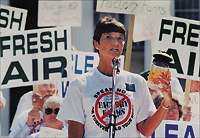|
by Ken Midkiff
 When ranchers in Milford, Utah, were plagued a few years ago by upset stomachs and frequent trips to the "outhouse," they became concerned about the quality of their well water. So they convinced the Utah State Department of Health to test the wells for bacteria. When ranchers in Milford, Utah, were plagued a few years ago by upset stomachs and frequent trips to the "outhouse," they became concerned about the quality of their well water. So they convinced the Utah State Department of Health to test the wells for bacteria.
The agency determined that the ranchers' drinking water was contaminated with fecal coliform bacteria and -- as the ranchers had earlier -- cast an eye at the massive hog production facilities of Circle 4 as the likely culprit. Circle 4 houses 250,000 hogs, and it was assumed that the runoff from the operation's manure-storage lagoons had gotten into the groundwater. In one incident, thousands of gallons of liquified hog waste had been spilled into the subsurface.
The tests never showed the source of the contamination, but Circle 4 was ruled out when it was discovered that its fecal coliform bacteria was immune -- not merely resistant -- to antibiotics.
The industrial method of livestock production (called CAFOs, for concentrated animal feeding operations) requires massive amounts of antibiotics as appetite enhancers and growth inducers. The agency tests in Utah were the first "official" recognition that the bacteria present in animal wastes have become immune to antibiotics.
Since then, a number of health professionals have become alarmed about the situation: The antibiotics used to treat gastrointestinal and more serious health problems caused by pathogens are becoming ineffective against those very pathogens. The Union of Concerned Scientists has stated, with documentation, that about 70 percent of antibiotics produced are used in animal agriculture.
The proliferation of these warehouses, which frequently threaten waterways with leakage and spills from their manure lagoons and sprayfields, brought the Sierra Club's CAFO/Clean Water Campaign into a number of new states as local residents contacted the Club for help.
 Over the past year, the campaign's staff and volunteers ventured into new territory, fighting CAFOs or pushing for enforcement of regulations at hog factories in Sunray, Texas; Divide County, N.D.; Beatrice, Neb. and Ramona, Calif.; as well as dairies in Bryan, Ohio; Clovis, N.M. and Twin Falls, Idaho. Over the past year, the campaign's staff and volunteers ventured into new territory, fighting CAFOs or pushing for enforcement of regulations at hog factories in Sunray, Texas; Divide County, N.D.; Beatrice, Neb. and Ramona, Calif.; as well as dairies in Bryan, Ohio; Clovis, N.M. and Twin Falls, Idaho.
The campaign's staff and volunteer committee members -- who hail from Kentucky, Tennessee, Missouri, and Maryland, to Utah, California and even Canada -- have orchestrated a strategy that goes beyond organizing in the field. The campaign is also providing a significant amount of input to the Environmental Protection Agency's proposed new regulations for CAFOs. While the proposed rules are weak in terms of protecting the environment, public health and the rural quality of life, one laudable section would make the large corporations co-liable for harm caused by the farmers they pay to raise the animals, instead of leaving these farmers taking the blame alone.
The campaign also works closely with the Club's legal team, which filed lawsuits in Michigan and Oklahoma in 2001 to support ongoing efforts on the ground.
In 2002, the campaign will take on the public-health implications of antibiotic use in these factories.
New Year's Resolution: Educate consumers about this threat, and inspire them to convince the big supermarket chains to offer meat products raised without the use of antibiotics.
 |
| A very simple form of activism is requested: Ask the manager at your supermarket meat counter to provide an alternative to meat raised using antibiotics. |
Ken Midkiff is director of the Sierra Club's CAFO/Clean Water Campaign. For more information, check out the Website at www.sierraclub.org/factoryfarms; or contact Midkiff at (573) 256-5707; ken.midkiff@sierraclub.org.
More on Clean Water.
Photo (top) courtesy Peggie Griffin, (bottom) Jenny Coyle.
Up to Top
|